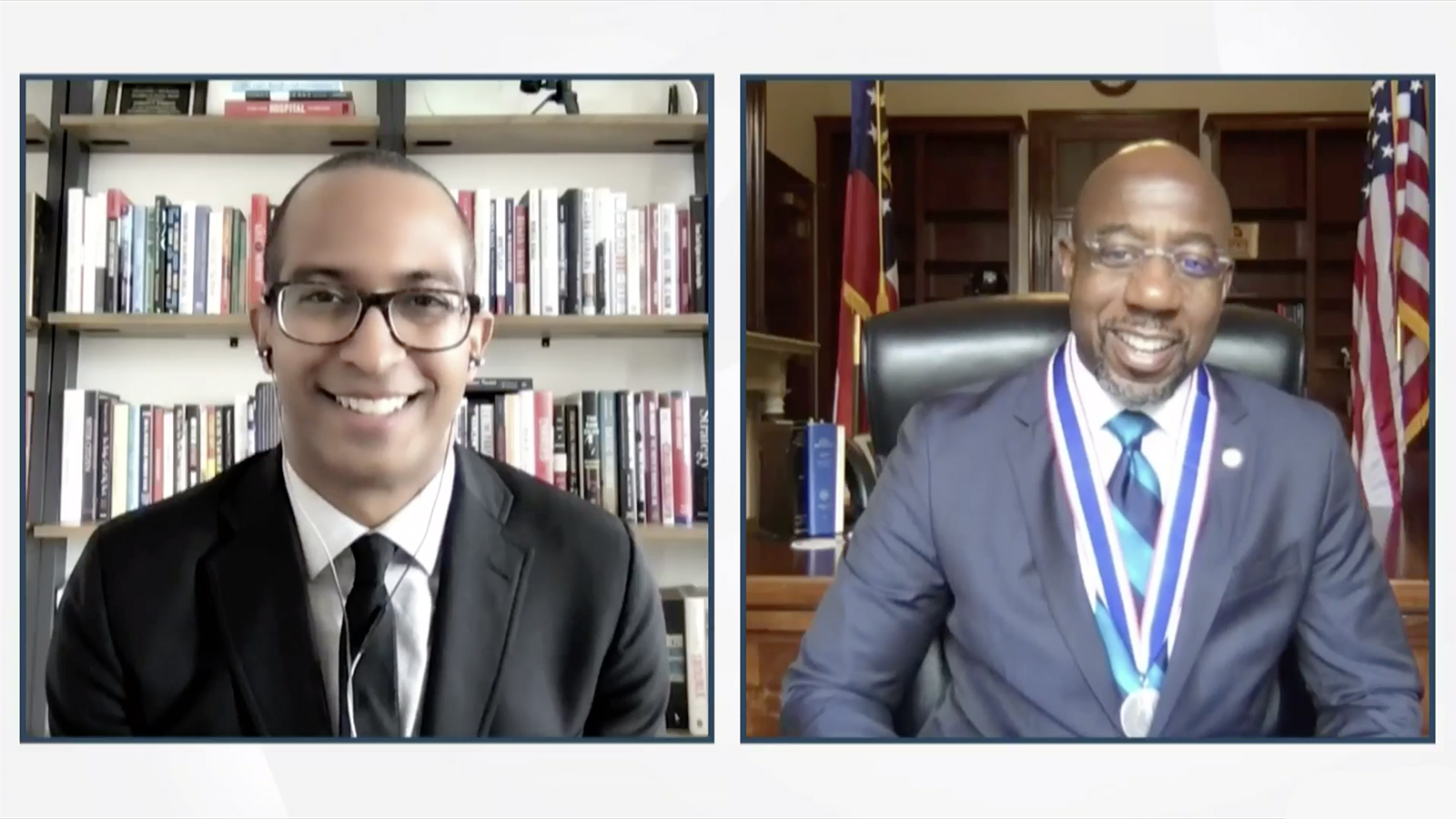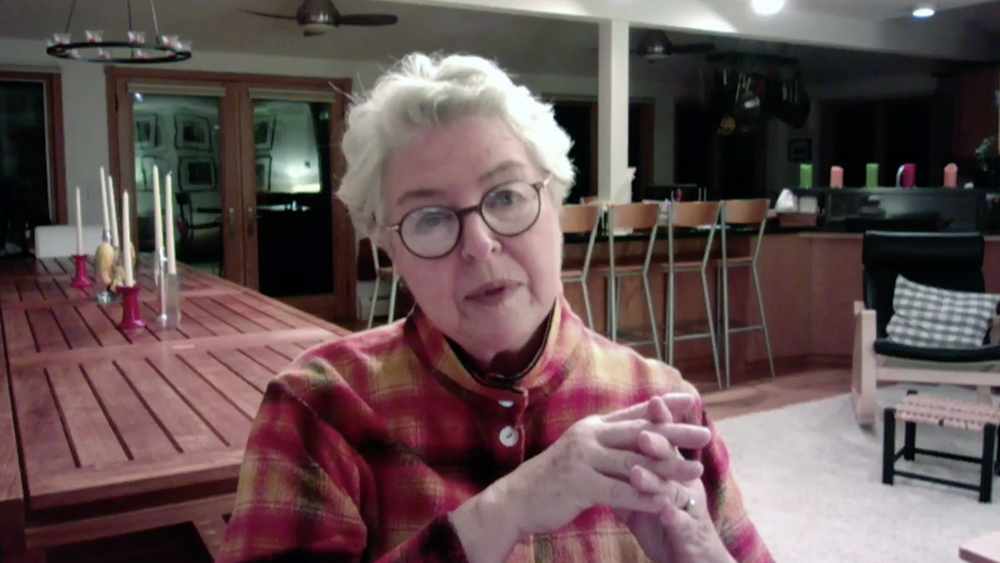by Adelle M. Banks, RNS | Nov 2, 2021 | Headline News |
(RNS) — Sen. Raphael Warnock, who continues to pastor his historic Atlanta church while serving as Georgia’s first Black U.S. senator, has received the Roosevelt Institute’s Freedom of Worship Award in a ceremony focused on racial justice.
“I really felt that the strength of his pastoral voice was unique,” Anne Roosevelt, granddaughter of President Franklin Delano Roosevelt and board chair of the institute, told Religion News Service hours before Warnock was honored in a Wednesday (Oct. 13) ceremony.
“And now, he’s in this new role in addition to his role as pastor at the church, but his voice is consistently counseling, teaching, making himself vulnerable in order to help the rest of us make sense of the world,” she said.
Warnock, the pastor of Ebenezer Baptist Church, where the Rev. Martin Luther King Jr. was once co-pastor, was honored on the same evening with New York Times journalist Nikole Hannah-Jones. She was awarded the institute’s Freedom of Speech and Expression Award after spearheading the newspaper’s 1619 Project that explored the history and legacy of slavery in the U.S.
The senator, interviewed during the virtual ceremony by Community Change President Dorian Warren, said he views himself as a “pastor in the Senate,” reminding the powerful not to ignore people with no wealth.

Dorian Warren, left, interviews Sen. Raphael Warnock during the Roosevelt Institute’s Four Freedoms Awards, Wednesday, Oct. 13, 2021, in a virtual ceremony. Video screengrab
“For me, faith gets engaged in the messiness of worldly struggle; it’s not hidden behind stained-glass windows,” Warnock said. “You probably could step over (the poor) but you shouldn’t. God warns us not to do that. My work is putting them always at the center. Because in their faces we see the face of God.”
The respective names of the Four Freedoms Awards are taken from fundamental liberties laid out in a 1941 speech to Congress by Franklin D. Roosevelt, who was elected to four terms in the Oval Office. He spoke of the “freedom of every person to worship God in his own way — everywhere in the world.”
His granddaughter, 73, said the institute, which has published reports and fact sheets on racial inequities, chose to take an “extra step” toward racial justice through this year’s awards.
“This is one event where we could say, ‘So what does it mean to be an anti-racist giver of awards?’” she said. “And to challenge ourselves and bring it to our own consciousness.”

Anne Roosevelt opens the Roosevelt Institute’s Four Freedoms Awards virtual ceremony, Wednesday, Oct. 13, 2021. Video screengrab
Anne Roosevelt acknowledged that African Americans and other people of color were often left out of her grandfather’s New Deal reforms.
“We are still falling short of making sure that we deliver the same benefits of our democracy to every person in our country,” she said.
While Anne Roosevelt’s grandfather and grandmother, Eleanor Roosevelt, were lifelong Episcopalians, she said she was raised Catholic and is not currently affiliated with a denomination. But as a member of the committee that nominated Warnock for his award, she said she appreciates him as a leader and as a person of faith.
“I don’t often reflect on Jesus, but when I do, I picture him being surrounded by the people who followed him,” she said. “He taught them how to live, how to live as the fullest and best expression of humanity. And I feel like Senator Warnock is in that mode.”
by Candace Howze, Urban Faith Contributing Writer | Feb 24, 2017 | Entertainment |
Last year, after nominations were announced for the Academy Awards and all 20 acting nominees were Caucasian in the lead and supporting acting categories, Magazine Editor April Reign (@ReignofApril on Twitter) started the viral hashtag #OscarsSoWhite.
Even actress Jada Pinkett-Smith joined the action by posting a Facebook video that went viral in which she admonished actors and filmmakers of color to produce and support stories that showed diversity.
The flurry of criticism about the Academy’s whitewashed membership and honors swept social media and water coolers the world over. Not only were the lead and supporting acting nominees all white, but all of the best picture nominees featured a less-than-diverse cast and no women were among the major directing and producing honorees.
A lot has changed since then. This year, there are a record six nominations for actors of color:
Denzel Washington and Ruth Negga are up for leading roles in Fences and Loving while the supporting categories feature Dev Patel for
Lion, Mahershala Ali and Naomie Harris for Moonlight, Octavia Spencer for Hidden Figures, and Viola Davis for Fences. The last three films are also best picture nominees and frequent winners this awards season. In the documentary category, films like 13th, I Am Not Your Negro, and OJ: Made in America have Oscar nods.
There was also history made behind the scenes: Joi McMillon is the first black woman nominated in film editing (Moonlight) and Bradford Young is the first African American nominated in cinematography (Arrival).
Many moviegoers were excited to see these films excel at the box office and obtain acknowledgment from prestigious institutions. Reign tweeted on Jan. 24: “I see y’all and I appreciate the support so much. Things are changing because our voices are strongest together.”
Brittany Hendricks, a post-production coordinator who’s worked primarily in television on shows like CW’s The Messengers and FOX’s PITCH, says her earliest Oscars memory was Halle Berry’s 2002 win for Monster’s Ball — the first time a Black woman received the honor for best actress.
“This year is such a big year for black films [and] movies like Lion are opening the doors of diversity as well,” Hendricks said. “It’s showing young kids that people like them with stories like theirs have a worldwide impact in a way that I didn’t see when I was a kid.”
Many people attribute the nominations to changes within the Academy, thanks to altered membership requirements from its president, Cheryl Boone Isaacs. The organization is currently 46 percent female and 41 percent minority as opposed to its mostly white male composition just a year ago.
However, it may actually take more time to see whether the membership changes and increased social pressure have actually changed  the Oscars, given that all of these films were in production or near completion during last year’s protests.
the Oscars, given that all of these films were in production or near completion during last year’s protests.
Academy Award winner Octavia Spencer recently told Entertainment Weekly: “When you know how movies are made, the explosion of films with people of color is not a reaction to #OscarsSoWhite. The tide has changed, but we still have a ways to go, because they still aren’t inclined to greenlight a movie that’s starring a person of color, without a long list of white box-office people.”
A prime example was last year’s Birth of a Nation, a Nat Turner biopic that broke records at the Sundance Film Festival and was early talk for awards season after having barely secured funding. After past sexual assault allegations arose about its writer-director-star Nate Parker, all buzz around the film died, a stark contrast to Casey Affleck, whose film Manchester by the Sea is up for several awards despite his own very recent sexual assault allegations.
So, are the recent nominations somewhat misleading? Last year, only 7 percent of directors, 13 percent of writers, 17 percent of editors, and 5 percent of cinematographers were women based on a recent Celluloid Ceiling study. Despite the influx of minorities this year, they are all African American except for Patel. Although Black activists led the call for change, Reign explicitly used the hashtag “#OscarsSoWhite” because she was appalled by the lack of diversity for all ethnicities.
“One year of films reflecting the Black experience doesn’t make up for 80 yrs of underrepresentation of ALL groups,” she tweeted in January. Spencer seconded this by saying our biggest voice is heard by supporting movies whose casts reflect diversity.
“If I look down a list of characters on a film, and it doesn’t have gay, African-American or Latin characters, I’m probably not going to spend my money on the ticket,” Spencer said. “When we stop supporting things with our dollars that don’t represent all of us, then you’ll see an explosion of diversity.”
Television consistently proves that shows spotlighting artists of color can appeal to the mainstream in large numbers. Empire, whose viewers are mostly Black, has earned Emmy and Golden Globe awards. The most recent Nielsen TV viewership analysis shows that predominantly non-Black audiences watch hit shows like This Is Us, Black-ish, PITCH, How to Get Away with Murder, Atlanta, and Insecure, one of Hendricks’ favorites.
“I’m so incredibly inspired by Issa Rae! She started out with “Awkward Black Girl” on YouTube and now she’s the creator and star of “Insecure” on HBO. I just love how she didn’t wait for someone to give her a platform to tell our stories,” Hendricks said. “She created one of her own until people took notice, and now she’s helping other young storytellers like herself do the same thing.”
It appears that Hollywood may finally be taking notice of something TV networks are taking full advantage of, and the result will hopefully be storylines that are more inclusive. This year’s awards will have more color, and that means a lot to the people watching at home and the filmmakers working in studios. Last year, Will Smith said he was worried about all the kids who might be watching the Oscars and “not see themselves represented there.” One thing’s for certain: That won’t be such an issue on Sunday.
The Oscars will air Sunday, Feb. 26, at 8:30 p.m. EST on ABC.
Who will you be rooting for at the 2017 Academy Awards? Share your thoughts below.



 the Oscars, given that all of these films were in production or near completion during last year’s protests.
the Oscars, given that all of these films were in production or near completion during last year’s protests.